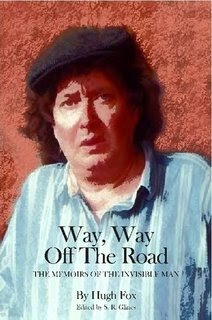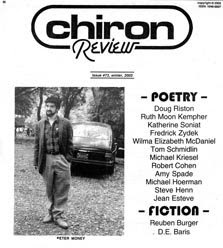
On/Off The Beaten Path:The Road Poems
by R.D. Armstrong
What is it that addicts us to the tease of R.D. Armstrong? Not knowing which ache of his existential wound he’ll exhibit next? Or where he’ll next bed his crotchety ass?
It’s certainly not the free punctuation, which except for a few grudging dots and dashes, you supply as you travel this long, looping paean to the road, mainly that coastal, crystal road which shoots along the Pacific from L.A. to Seattle .
No. For a punctuated map, you would do much better calling AAA. So it must be the landscape of R.D. Armstrong’s psyche and soma which so attracts us… or so repels us. Or is it both?
Know, before you leap, that R.D. Armstrong is the head honcho of The Lummox Press, based in L.A., and that, from this office, he warns subscribers that they might well become the “stepping stones” by which he “fords the stream of consciousness”. In other words, expect a visit from a guy who thinks best when he’s driving from place to place and needs a bed to bunk in.
And before you think yourself safely immune from the blandishments of any hustler who so ingenuously tells you he’s going to use you as a “stepping stone” , think again.
A large part of R.D. Armstrong’s loopy charm is that he can’t be bothered to hide his most nefarious intentions.
Hitch-Hiking readers, as well as hapless subscribers, know from the get-go, soon as they climb into his crotchety ’88 Nissan Sentra and seat themselves by the crotchety driver, what kind of spin they’re in for.
But, believe this reviewer, knowing R. D. is not enough. The dynamic in this danger is that R.D. knows you!
Most insidiously, he knows you speak “American”, and live the American dream. And thus formed he knows you hunger to converse with a speaker caught up in the same thundering contradictions and ephemeral illuminations as others so isolated and so joined.
By turns folksy and sly, encyclopedic and microscopic, genial and dyspeptic, social and
private. And with all these contradictions still talking to himself and piloting us to places we’ve
never seen before. At least not through his eyes.
And whether the fatal charm in that is the places or the perspectives, you, dear reader, must decide.
As befits a loner, albeit a choosey one, R. D. has an unsparingly sharp eye for herd behavior – especially of the consuming and colonizing variety.
As he approaches San Francisco, “SanFran” to him, R.D. notes ominously:
“Suddenly a bend reveals
a herd of suburbia as
frightening and sudden
as a herd of pastel buffalo sweeping
across the hills of South SanFran.
At least part of the frisson in this image lies in the melding of that iconic beast of freedom, the American Bison, into a herd of suburbanites. Both the buffalo who roamed the plains as well as the plains themselves have been transformed into “us” and our hive-like habitations.
This note of culpability will be sounded more than once in R.D.’s travels. Again, when he is spending his few pence for: “a loaf of bread some apples and some celery” he characterizes with biting wit the frenzy of the shoppers around him:
Shoppers around me seem almost
Giddy as if someone was handing out
Free samples of the blood of Kali –
One sip and you’re hooked one sip
And whatever the bossman tells
You to do you do it gladly because
Everyone wants to be a happy
Camper…
Now, the reader can’t help noting that the narrator is himself a “getter and spender” and therefore himself one of the culpable actors in this drama. R.D. does drive a car, however venerable. Also, he buys and consumes supermarket fare - though it is simple fare and it is consumed “right out in the parking” lot.
There are many points in this odyssey when the reader might well wonder if the contradictions inherent in speaking “American” excuse the narrator from every
hypocrisy - and the passenger/reader from tagging along.
My fatal attraction resided, as far as it can be analyzed, in the charms of my driver’s prose/poetry joyride, and in the ritual penances, not unfeeling told, that R.D. performs along the way.
First, the charms are many. Could Oscar Wilde, himself, burdened with an English of formal, punctuated cadences, have gathered such ethereal images by America’s highways and byways as our strenuously homegrown poet? Listen:
“Lane 101 twists and turns along the
Western band of Puget Sound on a
Typical Washington morning globs of
Fog hang wet and low fishermen are
Merely silhouettes on mirrors no breath
Of wind except for motorhomes that whip by
On their way north…
Or, again, remembering another journey, in altogether different terrain:
“Perhaps it’s the way the desert
camouflages its constant state of movement –
hidden from our casual glimpses out
across the seemingly endless nothing –
that sets us up for the next surprise…..
A land devoid of definition
A blur of shapes
Of dirty / washed out colors.
And yet
a sudden splatter of
confetti-white
shatters a cool sky-
a cluster motion
that blinks on..
then off! Then on..
Then off!
It is only a flock
Of white birds flying
In a wide circle but
In this endless caged
Monotony of road noise
And white line fever
It is an aerial ballet
exquisite.
After a few of these passages of lyrical beauty and etched wit, I felt myself more indulgent of what before seemed posturing. Flawed he may be, but the man can fly - especially if irked by one of our national manias or tantalized by roadside beauty.
I even made my peace with his quirky punctuation, or lack therof, thinking, perhaps it’s a style tailor-made to a discourse less of logic than of percepts, of sudden moments of beauty or inanity, both of which snatched away my driver’s breath – and his punctuation.
But, perhaps the final fascination linking us together for the journey was not simply R.D.’s lively esthetic susceptibility nor his witty jibes at our more clownish mores, but my glimpsing, in this aging hippy, the somberly clothed profile of my long-suffering grandmother counting out the sorrows of her life on clicking rosary beads.
Yes, no matter how tonic the change of scenery, a sudden windfall of book sales, or the encounter of an old friend, or new one, well-met, R.D.’s sense of the tragic in life and in self is as a cup filled to the brim and often pressed to the lip.
Smack in the middle of a jam session among new friends on an early stop along his journey, a buoyant R.D. “noodling around on my Casio digital horn and tone generator” suddenly and surprisingly plucks a note of gratitude mixed with deep melancholy:
“I couldn’t know that the sadness
that fills each waking moment
could be so universally accepted
by people I never met.”
“Is this Laguna Beach, or “Dover Beach”?” the reader wonders, suddenly shifted from one time and place to another by these very unCalifornian sentiments.
But this is no misprint, and this journey, however “West-Coast” is no unalloyed joy-ride.
“Ah, Nissan, let us be true to one another!” could well be an up-dated duet sung by R.D. and Mathew Arnold, our mid- Victorian bard who heard so clearly the “melancholy, long, withdrawing roar” of the “Sea of Faith”.
But what drear note does our Californian bard hear? And once heard, can it ever be transcribed into our demotic lingo?
R. D. Armstrong will try manfully to sing this note; sometimes the note sneaks up on the singer and fills him with vatic urgency as on R.D.’s approach to his friend Todd Moore’s home:
“Six hours later
in the guest bed
making notes
I wonder what
I was worried about
No te preocupes, eh ?
(no worries)
Except for the accursed shadow
That dogs my every move.
Someday I’m gonna be found out.
Someday the phony-baloney from L.A.
Will be unmasked…”
Suddenly our grizzled hippy guide tooling along Western highways and byways become a flagellant in one of those medieval processions plucked from a Bergman epic.
What relieves and redeems this constant note of angst is its power to alter and even to occasionally transform the lyrical note that is the “tortured” R.D.’s other voice:
“A train moves across the
desert like Morse Code –
dots and dashes heading
south towards Amboy
all washed in muted hues of desert
grays and greens.
In this image, the train, journeying from here to there on a certain schedule but, in the larger scheme of things, an uncertain destination, becomes an analogue for R.D., himself a coded message as he journeys from here to there in this always remarkable, sometimes forgiving landscape.
More often, the spectacles that ease R.D. Armstrong’s existential ache are the ones that man has not yet made into his own imperfect image, the scenes between the towns where R.D. peddles books and meets his contributors and readers.
One such scene, as final and as summative as any of R.D’s endless questing, is a good note to leave on:
Climbing now, eyeball to eyeball
with red-tailed hawk
and sore-assed snowbirds
migrating north for the summer.
Five thousand feet of
blue sky spreading wide
like smile on mother of
prodigal son
then sudden puff of
single cotton-tail cloud
drifting lazy
across vast and holy blueness.
Are R.D.’s travails and triumphs, highs and lows, as substantive to you, the reader, as they are to him?
No need to decide soon. As long as there is gas to top up his tank, and juice in his publishing presses, R.D. Armstrong will be “On/Off the Beaten Path” – and ready to swing open his door for any hitchhiker/seeker
to hoist his thumb and his need into view.
J. C. Foritano/Ibbetson Update/ Somerville, Mass.






























































